- After months of extensive testing here in China, we’ve updated our Best China VPN guide to help you unblock the web and access Facebook, Google, Youtube, Instagram, Whatsapp, and others.
- If you are coming to China for work or travel, a fast and reliable VPN will be the most essential app for your smartphone or computer.
Quick Summary: Best VPNs for China in 2019
#1. ExpressVPN: Fast & Reliable – Editor’s Choice
If you are looking for the best VPN for China that:
- works reliably in China
- has good speed
- has great apps that are easy to use
- allows you to connect multiple devices on the same account
then ExpressVPN should be your first choice. ExpressVPN has the best connection reliability and speeds out of all the VPN services we have tested. It’s easily our #1 recommendation for expats and travellers who need to connect to Google / Facebook etc while in China.
Get ExpressVPN
*3 Months FREE!
#2. Astrill: an old favorite
Alternatively, many users like to use Astrill as their go to VPN in China. While speeds are very good with Astrill’s China Optimized servers, the reliability can be hit or miss, especially during certain times of the year when service has been known to completely break down.
#3. NordVPN: Advanced China VPN
NordVPN is a solid choice for those looking for an advanced VPN that is effective against the sophisticated internet filter technology in China. With a combination of great mobile and desktop apps, fast speeds, and effective servers, NordVPN gets our seal of approval for users in China.
Contents
- Quick Summary: Best VPNs for China in 2019
- Top China VPNs Compared
- Why you DEFINITELY need a VPN in China
- How to Choose the Best VPN for China
- #1. ExpressVPN – Our Top Pick
- #2. Astrill – popular in China / fast proxy
- #3. NordVPN – Advanced Anti-Censorship Technology
- #4. 12VPN – designed for China stealth options
- #5. AirVPN – Sophisticated protocols
- China VPN Tips and Tricks
- Frequently Asked Questions
- Using a VPN to get into China
- Useful Resources
Top China VPNs Compared
Astrill |
ExpressVPN |
NordVPN |
|
|---|---|---|---|
| Rank | 
#2 |

#1 Editor's Top Pick |

#3 |
| Rating |
4.0 / 5 |
5.0 / 5 |
4.0 / 5 |
| # of devices | 1 | 3 | 6 |
| VPN Modes | OpenWeb Proxy, StealthVPN, OpenVPN, IPsec | OpenVPN TCP / UDP, IPsec, Chrome Plugin | OpenVPN, IPsec, Obfuscated VPN |
| Mobile Apps? | |||
| Servers | 150+ servers, 50 countries | 1,500 servers, 95 countries | 3621, 61 countries |
| Fastest Server | China Optimized USA, Los Angeles, Hong Kong | Los Angeles, Hong Kong, Taiwan, Japan | Hong Kong, United States |
| Torrent? | |||
| Trial | 7-day trial | 30-day money back trial | 30-day money back trial |
| Website | Get ExpressVPN |
Tip #1: Make sure that you download and install your VPN on all your devices before you come to China. The Google Play store and most VPN provider websites are blocked in China.
Tip #2: Expect VPNs to be intermittently blocked around the Chinese New Year festivals this month. Back up VPN solutions are highly recommended.
Tip #2: Keeping your VPN apps updated to the latest version will let you connect easier during your stay in China.
Why you DEFINITELY need a VPN in China

Foreigners who arrive in China for work or travel quickly realize that many of their beloved websites and social media apps are blocked and inaccessible within the country.
Some notable blocked websites and apps include: Google, Youtube, Facebook, Snapchat, Twitter, Instagram, most Western news sites, Wikipedia, and many others. This country-wide internet censorship is often colloquially referred to as the “Great Firewall of China”.
The vast majority of foreigners in China use a VPN (or virtual private network) app to bypass the Firewall and connect to blocked websites and apps. A VPN basically works as an (encrypted) internet traffic intermediary between a user and the blocked website they wish to access.
VPNs blocked within China
The demand of VPNs for Netflix, online privacy, and public Wifi hotspot security has led to a vast number of different VPN providers popping up in the market.
Unfortunately most of these VPNs do not work inside China. This is because the most basic VPNs tend to use a plain protocol called OpenVPN that is detected and actively blocked by the Great Firewall of China.
How to Choose the Best VPN for China
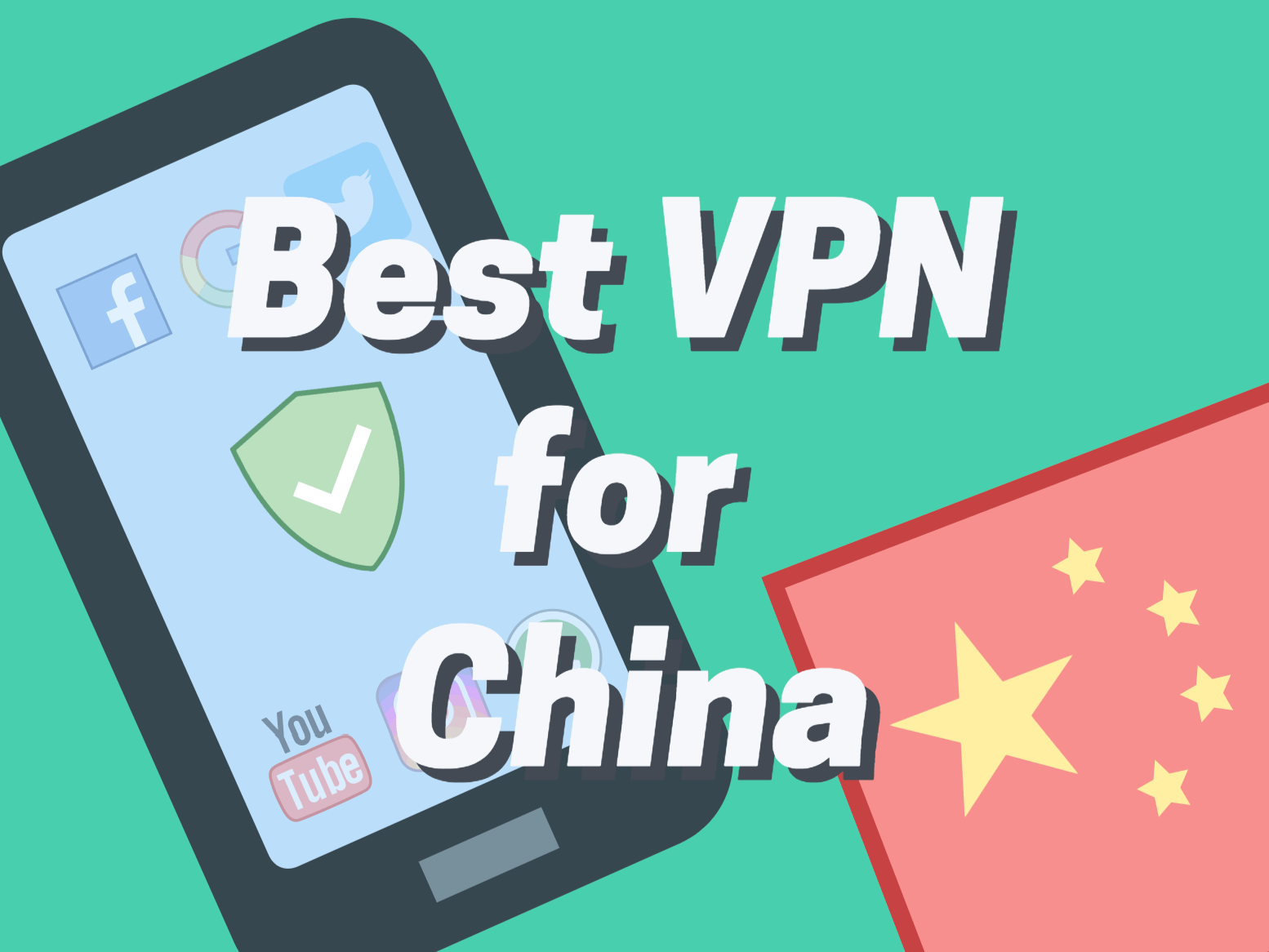
Using a VPN in China has its own quirks. Most generic VPNs are not very effective for unblocking the web in China due to advanced censorship filter technology. Here are some things to look for when choosing a VPN for China:
1. Is it blocked? VPN masking and stealth technology
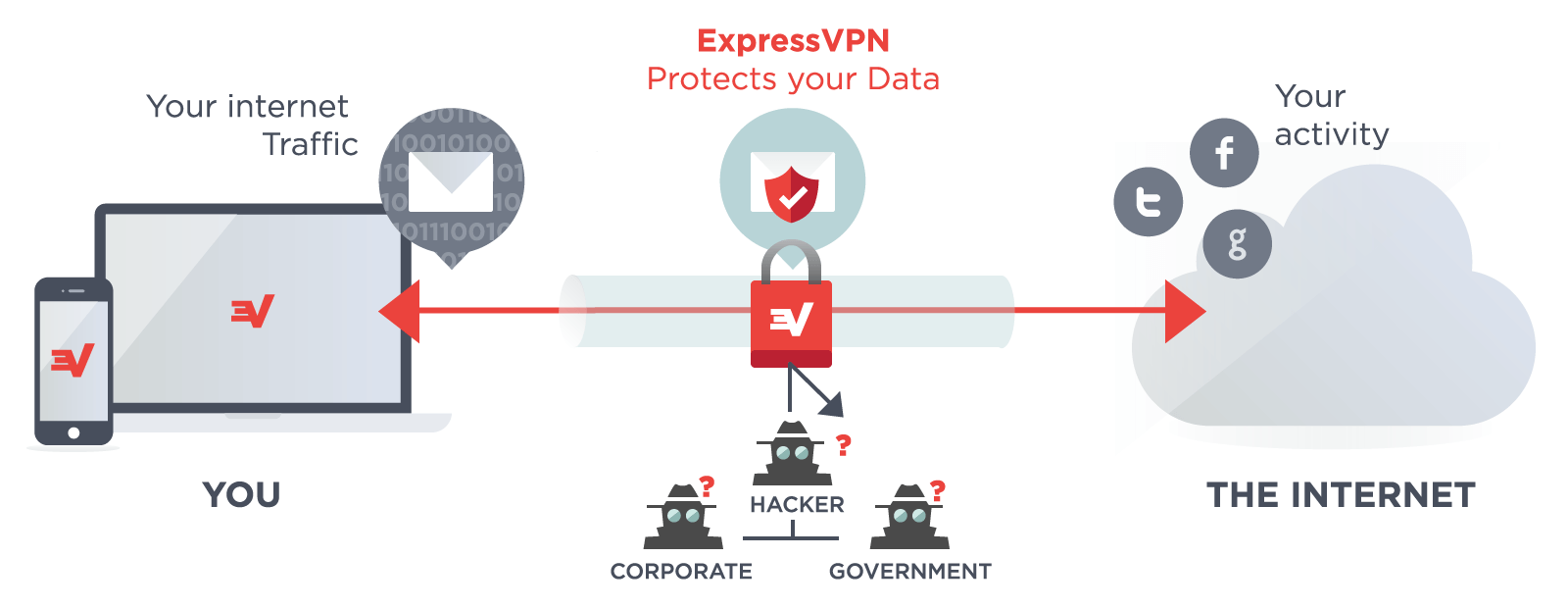
This it the first and most important criteria for selecting a VPN for China. Many small VPN providers intended for use with Netflix or online privacy will not work in China due to active VPN protocol blocking.
The Great Firewall in China has evolved over time and is very sophisticated. While its exact method of operation is not known, observers speculate the GFW uses Deep Packet Inspection to determine signatures associated with the OpenVPN protocol. It can then either throttle or outright block basic OpenVPN connections.
The best VPNs for China will employ special methods to mask the VPN-use signal. Look for VPNs that advertise “stealth”, scramble, shadow, extra SSL, stunnel, or shadowsocks options in their apps.
2. Connection Reliability
Nothing is more frustrating than having your VPN app drop your connection frequently or needing multiple tries to initially connect to a VPN server. A great China VPN will maintain a connection consistently with high speeds.
Be aware that some VPN services will be actively blocked during certain times of the year (such as Chinese New Year).
3. VPN Download and Upload Speeds, Latency

When using a VPN, you should expect that your download and upload speeds will be a bit slower than when not using a VPN. This is because your internet traffic is being encrypted and routed to another server before reaching the intended target.
The best VPNs for China tend to use servers that are optimized for users in China. Servers that are located geographically close to China (Hong Kong, West Coast US, Japan) with direct peering to the main Chinese ISPs (China Unicom, China Telecom) are generally the best.
4. Privacy and Security
A VPN service will route all your internet traffic through their own servers so it is crucial that you can trust your VPN provider not to log, snoop, or expose your web traffic data.
As a minimum, you should look for VPN services with a clear “no logging” policy. Stick with well known VPN companies that have accountability and avoid smaller VPN services that have no company information.
5. User Interface (dedicated apps)
Most VPNs are quite easy to install on your computer via download from an official website or app store. Setting up your VPN service on your smartphone is easy if your service offers dedicated official apps.
Unfortunately, not all VPN services offer official apps on both iOS and Android. Some smaller VPN providers will require you to manually setup your VPN in your device settings or use a generic 3rd party app (which might not be free!).
Other things to look for when choosing a VPN
Other criteria you may want to consider include:
- Price – most VPN services are between 5 – 10 dollars per month. Beware: some cheap VPNs are really terrible — you get what you pay for.
- Number of simultaneous connections (most allow 2 minimum)
- Security — most VPNs use 256-bit SSL or AES. Stay away from PPTP.
- Server locations – more servers, the better. You will also want to choose a VPN that has many servers on the West coast of the U.S., Hong Kong, Japan, and Singapore, as these locations usually have the best performance for China users.
- Payment with bitcoin – for extra privacy. Some VPN providers also allow payment with WeChat Pay or Alipay (Chinese mobile payments)
- Trials – Most VPN services offer a free trial or money back guarantee which will allow you to test it out before fully committing to paying.
**Disclosure: Some of the apps that we test and highly recommend to our readers have affiliate programs. Basically, this means if you decide to sign up for one of the services after reading our reviews and clicking on a link we will get a small commission — at no extra cost to you. In fact, usually using our links will get you a discount on the normal price! The commission we receive helps us continue to run our site and continue to produce content free of charge to our readers.
#1. ExpressVPN – Our Top Pick
Pros
- Fast China optimized servers
- Reliable connections
- Easy to use apps
- Can use 3 devices at the same time on one account
- Works with Netflix
Cons
- Starting a new connection can be a little slow
ExpressVPN is our number one recommended VPN app for bypassing the internet censorship here in China. The dedicated apps are reliable on all major platforms (iOS, Android, PC, Mac) and the speeds are reliably fast.
ExpressVPN also ranks consistently high in various best VPN for China speed tests conducted by expat reviewers in the country on both mobile and desktop.
ExpressVPN app features
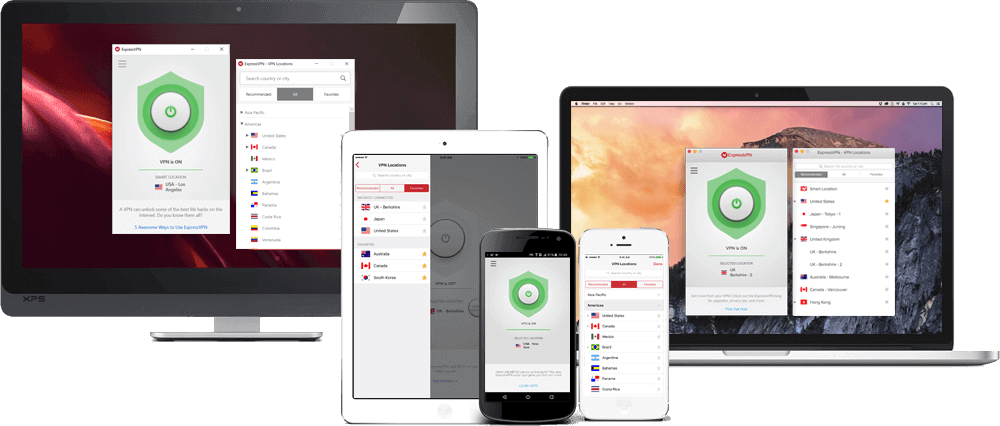
The Windows and Mac apps are well designed and with great features. There’s a server speed tester that automatically tests the latency and download speeds of all the VPN servers so you can choose the best one for your specific location. No need to manually test every different server to guess which one is the best for your location. In our tests, we found that the Los Angeles servers and Hong Kong servers tended to have the best performance.
The PC / Mac app uses OpenVPN TCP / UDP (along with some sort of Great Firewall stealth technology). Encryption is a standard 256-bit AES, which is the same encryption used by the US government to protect classified information. You can be confident that your internet traffic is secure.
The ExpressVPN PC / Mac app also features an internet kill switch which will turn off your internet connection temporarily if it detects a dropout in the VPN connection. This nifty feature will ensure your privacy is never exposed at any time.
ExpressVPN allows 3 simultaneous connections on their subscription — good enough to use your smartphone, computer, and tablet all at the same time. ExpressVPN also provides support for routers and Linux.
The iOS and Android dedicated apps are simple but effective. The iOS app uses the IPsec protocol and automatically reconnects if the connection gets dropped, which is very handy in China as congested 4G networks can be very flakey.
Privacy and Security
ExpressVPN claims to keep no logs of the websites you visit and you can even pay for your subscription with Bitcoin, for those who are concerned about privacy.
Overall ExpressVPN is a solid choice for those looking for a reliably fast VPN app when in China. They offer a 30-day money-back guarantee which is quite generous. It is recommended you sign up for ExpressVPN before you arrive in China.
Signing up for ExpressVPN
Getting an ExpressVPN account setup is fast and easy. Follow these steps:
- Go to ExpressVPN’s website (thankfully it is not blocked in China) and sign up for a plan. You automatically get their 30-day money back guarantee. Use our link and you get 3 months FREE, too!
- After filling in your details and paying, you will be given an activation key (a long string of random letters and numbers) Remember to copy this key!
- Download the ExpressVPN app for your desktop (PC or Mac) from the ExpressVPN website.
- Download the Express VPN app for your mobile device (iOS or Android) from the Apple App store or the Google Play Store. Android users in China will not be able to access the Google Play Store. You will need to manually setup your VPN connection before downloading the app from the Play Store.
- When you first open the app, you will be prompted to give you security key. Copy and paste it!
- Select a server and turn your VPN on to enjoy uncensored internet access!
#2. Astrill – popular in China / fast proxy

Pros
- StealthVPN mode effective in China
- Fast web proxy mode
- Good speeds overall
Cons
- Sometimes unreliable
- Stealth VPN mode costs extra
Astrill is one of the more well known VPN apps that are used in the expat community in China, and for a time it was the most widely used in China. It remains one of the best VPNs for China recommended on forums. Speeds are particularly good on the desktop app if you use the OpenWeb (technically it is a proxy — not a vpn — and only works on web browser).
Astrill VPN app Features
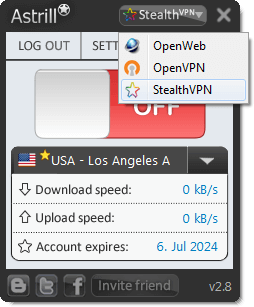
The PC / Mac app have some pretty nice features that are specific to China. “Smart Mode” allows the app to tunnel traffic to blocked sites, while doing nothing for unblocked sites — thus speeding up performance.
To make the most of Astrill in China, you will probably want to get the “Stealth” upgrade, which allows your PC / Mac to evade the Great Firewall on all internet traffic, not just your browser. The upgrade costs 5$ / month extra (but is free if you sign up for a 1-year plan).
The standard Astrill plan only allows one connection at a time — which is very stingy seeing as most VPN providers allow a minimum of 2 connections. You can upgrade by purchasing the “Family Plan” addon, which allows up to 5 connections at the same time However this will also cost an additional 5$ / month.
Astrill offers a pretty basic but very useable iOS and Android app. Simply choose a server and press the “ON” button to connect. The Iphone app uses the IPsec VPN protocol which will automatically reconnect to the server if the connection is dropped.
TIP: Android users will have trouble downloading and installing the Astrill VPN app in China since the Google Play Store itself is blocked in China (and needs a VPN to access it). To break out of this “chicken or the egg” scenario, you can setup a manual VPN connection in Android. All you need is your Astrill password, username, and the Astrill server address (can be found at the Astrill website when you log in).
Astrill boasts a large number of server all over the world (including China!). The best servers are the China Optimized servers based in the USA. Other servers such as Los Angeles and Fremont are also quite fast.
Astrill offers a free 7-day trial if you sign up outside of China. If signing up with an IP address within China there is no offer for a free trial.
#3. NordVPN – Advanced Anti-Censorship Technology

Pros
- Very effective advanced anti-censorship obfuscation servers
- Custom apps for mobile and desktop
- Fast connection times
- Website not blocked in China
Cons
- Cannot connect to the same server with more than one device with same protocol
NordVPN is a VPN company that is well regarded for its stance on protecting their users online privacy. Recently, the company introduced upgrades to their VPN app to help users bypass internet censorship in countries such as China and Iran. Through the use of obfuscated servers, which essentially scrambles VPN traffic traffic to make it look like normal internet traffic, NordVPN is very effective at jumping over the Great Firewall — unlike your basic plain VPN app.
In our tests we were able to get quick download speeds and initializing a connection was smooth and fast using the NordVPN custom app (available on Windows / Mac / Android / iOS). There are also plugins for Firefox and Chrome web browsers. The native apps were intuitive to use — just remember to select “obfuscated servers” in the advanced settings of the desktop app in order to bypass the GFW.
NordVPN also boasts a total of 6 allowable VPN connections per account — just keep in mind you cannot use more than 1 device to connect to the same server. But this usually won’t be a problem since NordVPN offers a whopping 3500+ servers in 61 countries.
Overall we believe NordVPN is a solid choice for those needing a reliable VPN app for unblocking the web in China and it gets our recommendation. NordVPN offers a 30-day money back guarantee so you can try it out first without any risk.
#4. 12VPN – designed for China stealth options
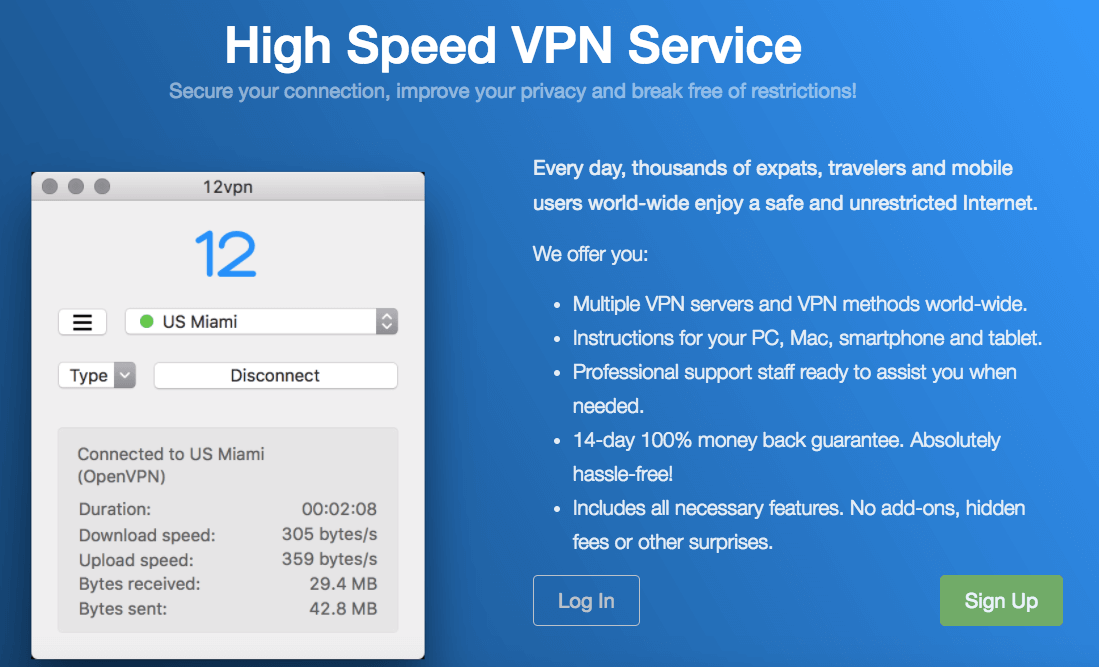
Pros
- Stealth VPN and OpenWeb proxy are fast and effective in China
- Good speeds
- MacOS and Windows apps work well
Cons
- No custom mobile apps
It’s very clear that 12VPN is a VPN service designed specifically for users in China — as there are multiple Stealth protocols and China optimizations. 12VPN is not a very well known VPN app, but that can sometimes be an advantage. While other VPNs are actively being targeted and blocked by the Great Firewall, 12VPN can remain inconspicuous.
12VPN App Features

The Mac / Windows app are very plain but manage to get the job done. 12VPN offers an OpenWeb proxy (for web browser), Shadowsocks, and also StealthVPN protocols (Mac only) — all included in the standard app.
12VPN allows for unlimited simultaneous connections as long as they are all your own personal devices (no account sharing). Torrenting is not allowed with 12VPN.
Speeds are fast when using OpenWeb on the China Optimized servers. We recommended using the Hong Kong or US servers for best performance. 12VPN does not have a huge selection of servers / country locations (only 16 countries) compared to bigger VPN providers. However, the vast majority of people will find their server selection more than adequate. Few people will need servers outside the US / UK.
The one major flaw of 12VPN: Dedicated apps for smartphones are lacking. In order to use 12VPN on your smartphone or tablet, you must download a generic 3rd party app such as OpenConnect (Android) or VPN ON (iOS) and manually installing each VPN server configuration profile by signing into your 12VPN account through your browser. Obviously, this is a huge hassle compared to the app experiences of other more polished VPN services.
12VPN currently offers a 14-day money back guarantee.
#5. AirVPN – Sophisticated protocols

Pros
- Many VPN protocol options that are effective in China
- Server load display
- Good speeds
Cons
- No custom apps for mobile
- Clunky user interface
- No free trial
AirVPN is a VPN company based in the EU that offers a number of interesting benefits for users in China looking to unblock the web. In addition to the usual VPN protocols such as OpenVPN and IPsec, AirVPN offers OpenVPN with SSH or SSL tunneling, which means you can get around the Great Firewall with ease.
The AirVPN app works on Windows and MacOS but unfortunately there is no custom app for iOS or Android. For mobile, you will need to download third party apps and load the server configuration files manually. The third party apps (OpenVPN Connect) are free but are a hassle to setup. The UI on the desktop apps looks very dated and might be intimidating to non-technical users.
Speeds on AirVPN are good when you use OpenVPN over SSL connected to servers in the USA or Canada. The app has a built in list of servers and their server load so you can pick the least busy server for best performance.
AirVPN allows 3 simultaneous connections on one account which should be enough for most people. Unfortunately, AirVPN does not offer a free trial but they have a 3-day plan that you can purchase for only 1 euro if you just want to try it out briefly. Overall, AirVPN is a good VPN to keep in mind for use in China, but there are definitely better options out there.
More VPN apps to try out
These are some other VPNs that are also recommended by others on the web.
- VyprVPN – Very Easy to use apps and great customer service
- StrongVPN – Stealth / scrambling technology to mask VPN connections.
- AirVPN – has SSL stealth VPN protocols which are great for evading censorship in China
- PureVPN – also has VPN servers located in China if you want to use Youku / Sohu etc
Here is another list of China VPN apps from around the web.
Free China VPNs
There are a number of shady “free” VPN solutions that exist out there, however we do not recommend relying on them for the following reasons:
- Free VPN services either have poor performance or poor features. Poor performance usually means the free VPN will be blocked in China. Poor features usually mean a restrictive data cap (500 MB or similar), which makes it very hard to use comfortably.
- Lack of data privacy: Tech companies providing free services usually make money by selling your usage data and marketing data to advertisers. Since a VPN is supposed to protect your privacy, we would not recommend using a free VPN provider who sells your data. Some free services use a peer-to-peer method of tunneling data. This is not very secure as you never know who is handling your traffic. There have been reports of free peer-to-peer VPN networks being used by botnets to do illegal or spammy activities.
As usual, you get what you pay for. Free VPNs will be prone to performance and privacy issues. It is definitely better to pay for a quality VPN service that you can depend on and trust. If money is really an issue then you can consider cycling through the many VPN services that offer free trials / money-back guarantees. Just remember to cancel your subscription before they start charging you!
If the above reasons are still not enough to deter you from using a free VPN you can check out the services:
- ProtonVPN – A free and unlimited bandwidth VPN that still works in China.
- Freegate – run by volunteers and academic institutions in Japan
- Lantern – works in China on Android and Desktop (browsers only), but no iOS.
- Psiphon – No macOS
- Windscribe – 2GB / month limit on free accounts.
Note: We DO NOT RECOMMEND USING THESE SERVICES. USE THEM AT YOUR OWN RISK!
Chinese VPNs
There used to be a number of VPN services sold on Taobao.com (the Chinese Ebay/Amazon) but they have suffered crack downs. Nowadays those services are not openly advertised as VPNs, but as “internet services” or “wall jumping” apps — basically secret code for VPNs. Unless you can read Chinese, we recommend you stay away from these services.
One homegrown method of internet censorship circumvention is the use of something called “Shadowsocks”, which is a type of VPN / proxy that is popular among gamers in China. Unfortunately, the use of Shadowsocks is pretty hit or miss these days. You’ll have better luck using a VPN for most applications.
If you are more technically in inclined, Google release a project called Outline, which allows users to create their own Shadowsocks server on a Digital Ocean server.
You can also ask local Chinese people for their VPN app recommendations. There are several Chinese Shadowsocks VPN apps that work well on mobile. Desktop is more hit or miss.
China VPN Tips and Tricks

- Always setup your VPN (on ALL your devices) before you arrive in China. The Google Play store is blocked in China, so Android users will be unable to download apps after arrival. Some VPN company official websites are blocked as well in China, though there are usually unblocked mirror sites that can be used.
- Test your VPN app before arrival. Contacting customer service might be difficult if your VPN’s company website is blocked in China.
- Choose servers based in Asia or the US West Coast. These servers tend to be faster and have lower latency. Hong Kong, Los Angeles, Taiwan, and Japan, are usually the best server location for VPN users in China.
- Different cities, ISPs = different performance: China is a BIG country and is served by different ISPs (China Unicom, China Mobile, China Telecom). A certain VPN server might work well in Beijing but it might be really slow in Shenzhen. Switch things up to see what works best for your specific location and Internet Service Provider.
- Try different VPN protocols – If one VPN protocol / mode stops working, try switching modes. The Great Firewall filter is constantly evolving, so what worked in the past may not work in the future.
- If you arrive in China without a VPN and cannot access the Google Play Store or iOS App Store, try setting up your VPN manually first. (IPsec or OpenVPN, your VPN provider should have instructions).
- If you spend a lot of time between China mainland and Hong Kong, you might want to consider getting a cross-border SIM Card in Hong Kong. These SIM cards allow data roaming in China with uncensored internet. You can also use using Google Fi data roaming to unblock the web as well.
- Use multiple free-trials to cover a short trip or vacation in China. Or, if you are generally concerned about data privacy and security (which everyone should be!), you might want to consider buying a VPN subscription full-time anyway — it is a security tool that has many uses even outside of China.
As always, depending on your specific device, router, ISP setup, your experience will vary. If in doubt, contact your VPN service provider through customer or technical support to get the best tips for your specific setup.
Frequently Asked Questions
Is using a VPN illegal in China?
Yes. Using any VPN service not approved by the government is illegal in China. The highest penalty is a 15,000 RMB fine. Note, even though VPNs are very common in China, only 2 people have ever been fined for using them, so the risk is very low.
Also important: Do not sell VPNs in China. This is a much more serious offense and could land you in prison.
What should you do if your VPN stops working?
Some quick fixes include restarting your VPN app, restarting your Wifi, or restarting your device. You should also try switching servers or VPN protocol (in the settings) if you have the option. Some VPNs allow changing ports, which could help too. If all else fails, contact customer support.
Should I setup a VPN on my router?
Many serious VPN companies offer the ability to setup a VPN directly on your home router. This can be really useful because it eliminates the need to install apps of all your devices and allows you to connect a virtually unlimited number of devices.
Expats in China wanting to use their Chromecast or video game consoles online will also need to install their VPN on their router.
Do I need a VPN for Hong Kong or Macau?
No, the internet is uncensored there.
Does Snapchat work in China?
Unfortunately, no. Most, if not all, foreign social media apps are blocked in mainland China.
Can I use Netflix in China?
Yes… sort of.
At the moment, Netflix does not operate in China. In theory, using a VPN with the proper server will mask your IP address and fool Netflix into thinking you are in your country of origin (US, Canada, Europe, etc).
Unfortunately, Netflix itself has been trying to crackdown on users trying to access different country libraries with VPNs. Many of the big name providers of VPN services have had their server IPs blacklisted and any attempt to connect to Netflix with those VPNs will show an error message.
The bottomline: If you use a small rather unknown VPN service, you probably can still use Netflix while you are in China (or travelling in other countries). Well known VPN services probably are blocked. We suggest using various VPN free trials to test out which ones will work for your specific needs.
What’s the difference between a Proxy and a VPN?
Sometimes when you shop around for internet censorship circumvention tools you will come across something called a proxy. A proxy works much like a VPN (a secure intermediary server) but only handles HTTP or HTTPS traffic (i.e web connections from browsers like Chrome, Safari, Internet Explorer / Edge).
A proxy can be a great alternative to a VPN if all you need is your web browser. However, people wanting to torrent on their computer, use other web apps or smartphone apps, will need to use a VPN.
Does SSH tunneling work in China?
Tech savvy individuals that do a lot of secure server connections with SSH will be shocked to find that the Great Firewall will throttle and close SSH tunnels that show unusual amounts of traffic. This means if you are transferring any large files via SSH, you are going to need a good VPN to mask your SSH connection.
Can I setup my own VPN in China?
Yes, this is possible. Tools such as Streisand and Outline VPN by Jigsaw (Google) can be used to install a VPN on a server you control (Digital Ocean, AWS, etc). This route might be more of a hassle than it is worth and is not necessarily cheaper than paying for a VPN subscription.
Will China ban VPNs?
Rumors of VPN bans in China surface from time to time, but VPNs seem to always survive. Many businesses and organizations rely on VPNs daily so it is very unlikely that they would ever be banned.
Using a VPN to get into China

Many expats returning home and Chinese people going overseas will realize that certain Chinese websites (usually video or music streaming sites such as Youku and iQiyi) are not functionally usable from outside China. This is usually because of copyright issues since some Chinese streaming sites stream full movies, albums, TV shows without paying royalties.
A VPN with servers located within China will enable you to use these streaming sites even if you are not in China. By masking your IP address with a China IP address, Youku/Sohu/etc will be fooled into thinking you are in China and you can use those websites normally.
Both Astrill and PureVPN offer a VPN service with servers located inside China. Speeds are usually decent but not the greatest. If you really need a China IP address to watch Youku etc, you might want to consider deploying your own VPN / shadowsocks proxy solution.
Useful Resources
What’s the Best VPN for China (that REALLY works)? – Frequently upgraded China VPN guide with speed tests conducted inside China on mobile and desktop.
List of blocked websites in China -Apps and Websites Blocked in China.
Best VPN for China Tripadvisor thread -Traveller forum discussing VPN for China on Tripadvisor.




